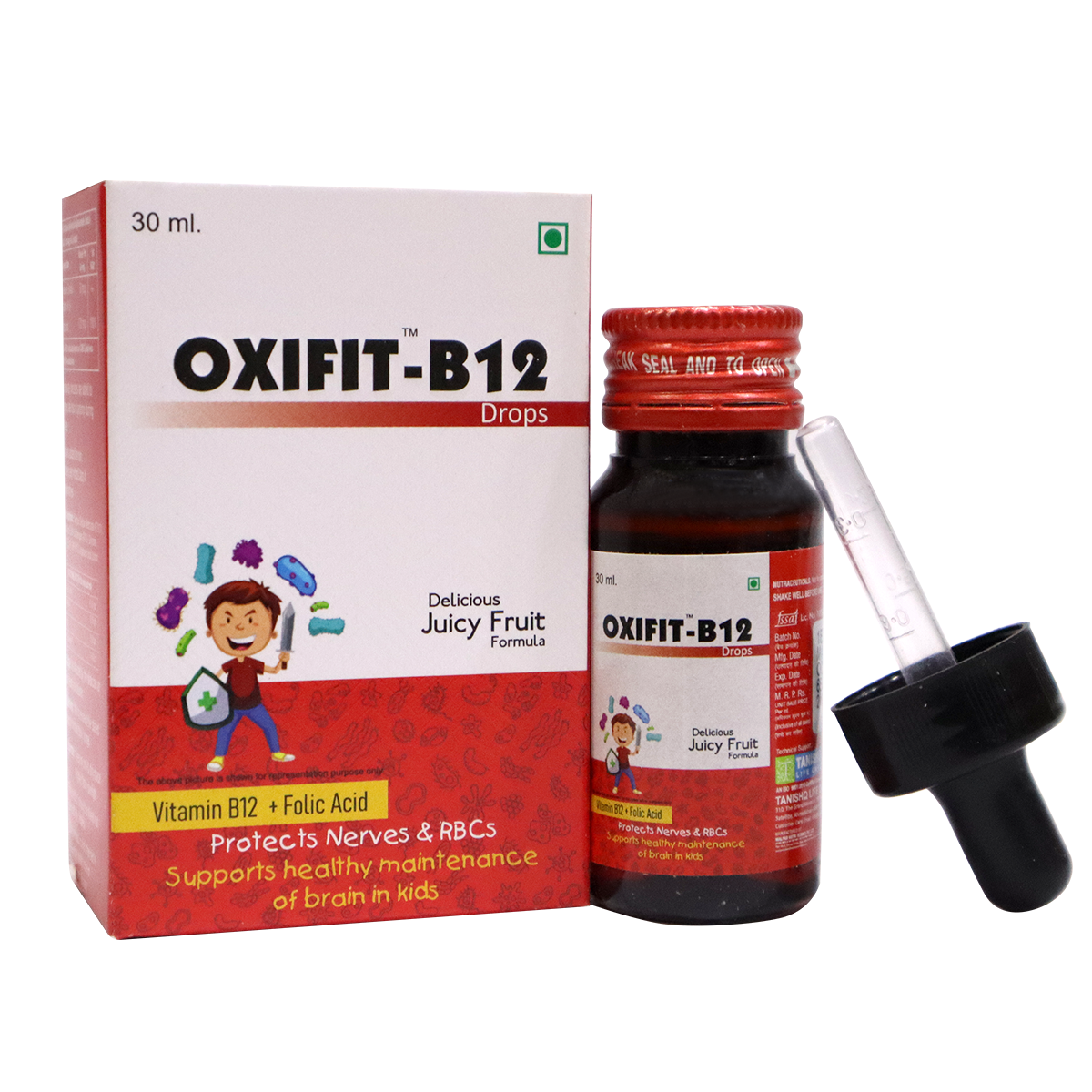
Oxifit-B12 Drops
This combination of Vitamin B12 and Folic Acid (also known as Folate) is often used for supporting various bodily functions, particularly red blood cell production, nerve health, and DNA synthesis. It is commonly found in liquid supplements, which can offer more direct absorption, especially for individuals who have difficulty swallowing pills or have digestive issues.
- Vitamin B12 (as Cyanocobalamin or other forms) is a water-soluble vitamin important for neurological function, the formation of red blood cells, and DNA synthesis.
- Folic Acid is the synthetic form of Folate, a B-vitamin necessary for proper cell division and growth, and it works synergistically with Vitamin B12 in many metabolic processes.
- Recommended Usage
Indications:
The combination of Vitamin B12 and Folic Acid is commonly used for:
Treatment of Vitamin B12 and Folate Deficiency:
- Anemia: These vitamins are crucial for the formation of red blood cells. Deficiency can lead to types of anemia, including megaloblastic anemia.
- Nerve Health: Both vitamins are involved in maintaining the health of nerves and can help manage conditions like neuropathy or nerve damage.
Support During Pregnancy:
- Folic Acid is essential during pregnancy to reduce the risk of neural tube defects in the developing baby.
- Vitamin B12 is also important during pregnancy, especially for women on vegetarian or vegan diets, as it supports fetal growth and neurological development.
Cardiovascular Health:
- These vitamins help reduce levels of homocysteine, a compound that, when elevated, can contribute to cardiovascular disease.
Cognitive Function and Mood:
- Both Vitamin B12 and Folic Acid have roles in maintaining cognitive function and mental health. Deficiencies may contribute to memory problems, depression, or other cognitive issues.
Dosage and Administration:
- The dosage of 50 mcg of Vitamin B12 and 400 mcg of Folic Acid per mL is quite potent, typically used when there’s a need for supplementation due to deficiency or other health conditions. The actual dosage depends on the individual’s needs and the advice of a healthcare provider.
- Common Dosage:
- Typically, 1 mL of the solution may be taken daily or as directed by your doctor.
- Some products might recommend a higher or lower dosage based on the severity of the deficiency or condition being treated.
- Administration:
- This liquid form is often taken orally, and may be measured using a dropper or syringe.
- It can be taken with or without food, though taking it with food can sometimes reduce any gastrointestinal discomfort.
- Absorption is typically higher with liquid forms, which can be beneficial for individuals with absorption issues or those needing faster replenishment of these nutrients.
Precautions:
- Allergic Reactions: Though rare, some people may experience allergic reactions to the components of the product. Symptoms can include rash, itching, or swelling. Discontinue use if any of these symptoms occur and contact a healthcare provider.
- Excessive Folic Acid: While Folic Acid is generally safe, high doses may mask a Vitamin B12 deficiency, leading to neurological damage if not treated. It is important that the combination of Vitamin B12 and Folic Acid is taken at balanced levels to avoid this issue.
- Vitamin B12 Overdose: Vitamin B12 is water-soluble, and excess amounts are typically excreted through urine. However, extremely high doses could cause side effects such as headaches, nausea, or dizziness, though toxicity is uncommon with B12.
- Pregnancy: Folic acid is crucial for pregnant women, but the recommended dosage of 400 mcg of folic acid is typically sufficient for most people. Higher doses may be prescribed in certain situations, such as for women with a history of neural tube defects.
- Kidney Issues: Individuals with kidney disease should be cautious and consult a healthcare provider before taking high-dose Vitamin B12 or Folic Acid.
- Drug Interactions: Vitamin B12 and Folic Acid may interact with certain medications (e.g., methotrexate, anticonvulsants). Always inform your doctor of any medications you're taking.
Product Category
- Anti Infective
- Injectables
- Pre Filled Syringe
- Immunosuppressants
- Anti Ulcerant/ppis
- Joint Care
- Enzymes
- Heamatinic Agents
- Antioxidant Multivitamins
- Laxatives
- Anti Alergic
- Corticosteroids & Combinations
- Anti Fungal
- Medicated Soaps
- Emollients and Moisturisers
- Face Care
- Puva & Sun Protectors
- Hair Care
- Anti Acne Preparation
- Analgesics Antipyretics & Anti Inflammatory
- Anti Spasmodic & Anti Emetic
- Expectorants Antitussives & Mucolytics
- Antidiarrheals
- Cardiac Drugs
- Antipsychotics
- Anti Epileptics
- Migraine
- Anti Dyspetic
